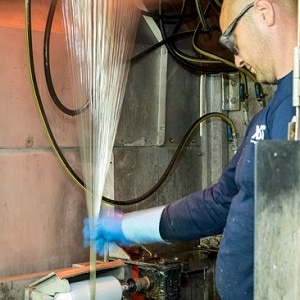LANXESS is set to break new ground when it comes to the development of customer-specific high-performance plastics. By deploying artificial intelligence (AI), the specialty chemicals company is looking to drastically cut the amount of time it takes to develop new materials. For this, LANXESS has entered into close collaboration with Citrine Informatics, a U.S.-based AI company specializing in data-driven materials development.

Collaboration with Citrine Informatics
The two companies have launched a pilot project aimed at gauging the potential of AI for the plastics production. The aim is to further optimize the glass fibers that LANXESS uses for reinforcing many of its high-performance plastics and ultimately to enhance the performance of the materials.
AI to Cut the Development Time
Glass fiber sizing plays a key role here. Glass fibers that are mixed with the plastics to increase their mechanical performance are surrounded with a sizing. This helps the glass fibers to bond more strongly with the plastic matrix, ultimately ensuring the properties required of high-performance plastics. The process of optimizing glass fiber sizing is complex, laborious and time-consuming. “We expect AI to cut the development time for optimized formulations by more than half,” says Dr. Axel Tuchlenski, Head of Global Product and Application Development in the LANXESS High Performance Materials business unit. “This will enable us to not only offer our customers even better tailor-made products, but also reduce time to market.”
AI to Recommend Formulations
In traditional product development, the complex composition of glass fiber sizings and the numerous variables when manufacturing high-performance plastics require extensive testing, the results of which can be hard to predict. AI can make an important contribution in this case by getting the most out of the available data. Supplied from thousands of measurement results from previous formulations, raw material information and a host of additional data, AI algorithms calculate forecast models for improved test configurations and parameters, enhance these models on the basis of the measurement results from each individual test, and finally propose an optimum formulation. This procedure makes product development much faster than traditional methods.
LANXESS Digitalization Initiative
For Jörg Hellwig, who heads the LANXESS Digitalization Initiative, the pilot project for the development of high-performance plastics is just the beginning for AI at LANXESS. “Artificial Intelligence is a vital technology for creating innovation from the myriad data within the Group.”
LANXESS launched its digitalization initiative in 2017, establishing a dedicated team. It is headed by Hellwig in his capacity as Chief Digital Officer who reports directly to Matthias Zachert, Chairman of the Board of Management of LANXESS AG. The initiative’s core action areas are to develop digital business models, introduce new technologies throughout the value chain, develop and utilize big data, and foster digital expertise among employees.
Citrine Informatics is the industry leader in the application of data-driven development methods to materials science known as materials informatics. The Citrine Platform accelerates the development of materials and chemicals using the power of materials data and AI. Citrine has been recognized for technology innovation by the World Economic Forum as a Tech Pioneer 2017, and won the Best-in-Biz Start-up of the Year Award in 2018. Citrine Informatics collaborates with some of the best universities in the world, including Carnegie Mellon University in Pittsburgh, Pennsylvania, and the University of California, Berkeley.